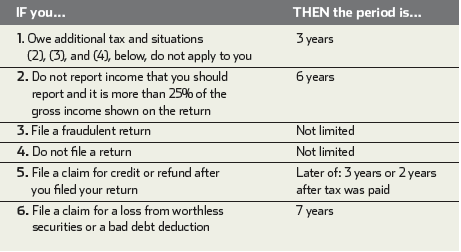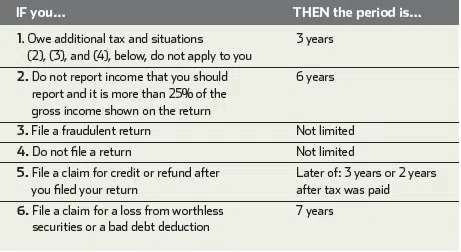An explanation and some clarity on the IRS guidelines.
How long should you retain business tax records? Even the Internal Revenue Service (IRS) will not give you a simple answer. The chart below is the IRS answer from its Publication 583, Starting a Business and Keeping Records.

What the IRS chart is trying to tell us is that, generally, you need to keep tax records at least three years. This is because the normal statute of limitations with respect to tax returns is three years. However, if the IRS determines that you have under reported your income by more than 25%, the statute of limitations is extended to six years. As a practical matter, we recommend to our clients that they retain tax records for seven years.
If you fail to file a tax return or file a fraudulent return, there is no limit on the statute of limitations. That is why the IRS says that you must keep records for an unlimited period of time. Of course, if you fail to file a return or you filed a fraudulent return, you have bigger problems than record keeping!
Historically, businesses have been concerned about record keeping requirements because of costs and administrative difficulties. However, existing technology allows us to retain records electronically, with very little cost and very little diffi culty. The IRS does accept electronic records, so long as the electronic storage system includes:
(a) reasonable controls to ensure the integrity, accuracy, and reliability of the electronic storage system;
(b) reasonable controls to prevent and detect the unauthorized creation of, addition to, alteration of, deletion of, or deterioration of electronically stored books and records;
(c) an inspection and quality assurance program evidenced by regular evaluations of the electronic storage system including periodic checks of electronically stored books and records;
(d) a retrieval system that includes an indexing system; and
(e) the ability to reproduce legible and readable hard copies of electronically stored books and records.
These requirements are not terribly onerous. A business could easily create an electronic storage system with the purchase of an inexpensive optical scanner and software that converts scanned documents to PDF format documents.
We are encouraging all of our business clients to think about developing a good electronic storage system for record keeping. It is inexpensive, and it is for the benefi t of the business as much as it is for the benefi t of the Internal Revenue Service.
Michael P. Coyne is a founding partner of the law fi rm, Waldheger Coyne, located in Cleveland, Ohio.




